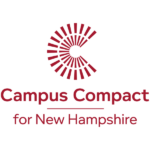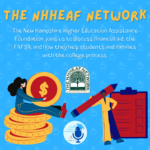Related Content

Events
Rural Conversations

Navigate: A Road Map for New Hampshire S

Podcasts
Dorm Sweet Dorm

Podcasts
Solidly Scholarly

Podcasts
Legally Speaking

Podcasts
The NHHEAF Network

Podcasts
Hairs to You

Podcasts
Admissions Advice

Podcasts
United We Serve

Podcasts
Talking TRIO
Dialogue Resources for Higher Education
Dialogue is a process in which groups come together to share experiences around issues that are often avoided or argued toward the goal of informed decision making. Dialogue involves mutual understanding, suspending judgment, and listening deeply, rather than seeking to win. Campuses engaged in dialogue use the tool to engage with diverse viewpoints in true civil discourse. A community that has a high level of dialogue skill creates enhanced experiences in co-curricular life, civic engagement, and curricular environments. Dialogue equips students, faculty, and staff with the skills to build shared understanding of challenges, to empathize with experiences very different from…
Aligning Institution to Community
Colleges and universities are anchor institutions in their communities. To adopt an anchor mission entails adopting a strategy to leverage institutional assets. Ways to leverage economic assets and revenues to promote local private-sector development include: Directing a greater percentage of purchasing power toward local and minority vendors based in the community. Hiring a greater percentage of the workforce locally. Providing workforce training for people needing assistance in the community. Incubating the development of new businesses, including social enterprise among nonprofits. Leveraging real estate development to promote local retail, employer-assisted housing, and community land trusts. Using pension and endowment funds to…
Increasing College Access
Higher education is the bedrock of a just, equitable, and sustainable future. Understanding that higher education institutions are responsible for preparing students to be engaged citizens, we together strive for the highest possible level of inclusivity. College access is central to this inclusivity, making possible a strong, healthy, active democratic society. One of a wide range of Knowledge Hubs from Campus Compact, Increasing College Access offers models, best practices, and resources for increasing college access.
Engaged Scholarship Toolkit
Campus Compact developed the Engaged Scholarship Toolkit to help faculty and administrators advance community-engaged scholarship on campus. The toolkit is designed to: Add clarity to the meaning and conceptualization of community-engaged scholarship in a research university context. Provide a rationale for why to do it and resources on how to do it well. Offer tools and assistance for faculty at research universities to document engaged scholarship for reward and promotion. Provide tools and assistance for assessing engaged scholarship. Find the Engaged Scholarship Toolkit on the national Campus Compact website.
NH College Access Forum Keynote Address
Major change is difficult in higher education. But to meet changing student demographics and expectations, change is necessary. This substantive keynote address from the CCNH/NHCUC College Access Forum explores how New Hampshire colleges and universities can change–by adopting policies that expand student access to and success in college. See the keynote address by Dr. Wanda Mitchell, Vice Provost for Faculty Development and Inclusive Excellence at the University of New Hampshire.
Confronting Student Success Challenges
Under what circumstances do student learn? What are the conditions that promote learning and success? This presentation, from Campus Compact for New Hampshire’s retreat on college success, explores these questions and more. See Confronting Student Success Challenges, a presentation by Jillian Kinzie, IU Center for Postsecondary Research.
 -->
-->
